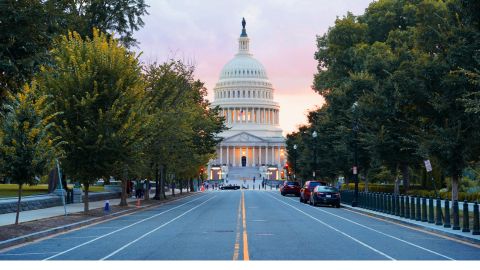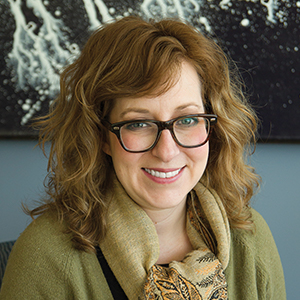ASBMB members head to Capitol Hill to advocate for NIH, NSF and DOE research funding
Members of the American Society for Biochemistry and Molecular Biology will meet with lawmakers and their staffs on Wednesday in Washington, D.C., to discuss fiscal year 2025 appropriations for major federal science funding agencies.
Ann Stock, a professor at Rutgers and the president of the ASBMB, said the delegation will emphasize the valuable contributions that basic science researchers make to the U.S. biomedical enterprise.
“Investing in scientific funding, and especially basic scientific research, is necessary to support a thriving innovation pipeline,” Stock said. “The fundamental discoveries made every day in labs across America lay the foundation for future solutions, therapies and cures.”
The 26 life scientists headed to Capitol Hill include ASBMB elected leaders, members of the society’s Public Affairs Advisory Committee and graduates of its Advocacy Training Program, a three-month science policy externship.
In short, the group will ask for:
-
$51.3 billion for the National Institutes of Health's FY 2025 budget to support its intramural and extramural programs that fuel the discovery-based biomedical research
-
$11.9 billion for the National Science Foundation’s FY 2025 budget to support the funding of fundamental research across all scientific disciplines
-
$9 billion for the Department of Energy’s FY 2025 budget to support its Office of Science and to support the national labs
The delegation will hold 63 meetings with the offices of U.S. senators and representatives.

Letter-writing campaign
Email your elected officials asking them to endorse increased funding for basic science. We've made it easy with this form.
Ann West, a professor at the University of Oklahoma and chair of the ASBMB Public Affairs Advisory Committee, said the delegation will talk about the value of basic research, educate lawmakers about how federal funding for science affects the economies of their states, and convey ASBMB members’ everyday funding concerns.
“Scientists are pursuing the new discoveries that will lead to better health and wellbeing for the American people, and they are dedicated to training the next generation of scientists who will lead tomorrow’s U.S. scientific enterprise,” West said. “Yet flat federal funding isn’t keeping up with the growing costs of personnel, equipment and materials needed for this essential work. Moreover, we know that the nation wants to train and retain the very best talent, so we need to invest in our future through science funding. We’re going to share the real-life impacts of flat funding with lawmakers and urge them to increase funding and help drive advances at the front lines of discovery science.”
The ASBMB elected leaders attending Hill Day include:
-
Ann Stock of Rutgers University, the ASBMB’s current president
-
Joan Conaway of the University of Texas Southwestern Medical Center, the ASBMB’s president-elect
-
Ann West, a professor and vice president at the University of Oklahoma and chair of the ASBMB PAAC
-
Jeffrey I. Brodsky, a professor at the University of Pittsburgh
-
Steven Caplan, a professor at the University of Nebraska Medical Center
-
Kevin Gardner, a professor at City College of New York Advanced Science Research Center
-
Olivia George, an assistant professor at the University of Hawai‘i–West O‘ahu
-
Marc E. Gillespie, a senior vice provost and professor at St. John’s University
-
Michael Grey, a staff scientist at Beth Israel Deaconess Medical Center
-
Shantá Hinton, a professor at the College of William & Mary
-
Jill Johnson, a professor at the University of Idaho
-
Matthew Koci, a professor at North Carolina State University
-
Karen Lewis, an associate professor at Texas State University
-
Neil Marsh, a professor at the University of Michigan Medical School
-
Himadri Pakrasi, a professor at Washington University in St. Louis
-
Rick Page, a professor at Miami University
-
Emily Pitsch, a graduate student at the University of Utah
-
Ronald Wek, a professor at the Indiana University School of Medicine
-
Jeffrey Wilusz, a professor at Colorado State University
The ATP participants attending include:
-
Maksim Dolmat, a postdoctoral researcher at UC San Diego
-
Sydney Haas, an undergraduate at New College of Florida
-
Joselyn Landazuri, a graduate student at University of Washington
-
Nidhi Shukla, postdoctoral researcher at Case Western Reserve University
-
Justin Wang, a fellow at the National Academies
- Isha Verma, research staff at the University of Michigan, Ann Arbor
Enjoy reading ASBMB Today?
Become a member to receive the print edition four times a year and the digital edition monthly.
Learn moreGet the latest from ASBMB Today
Enter your email address, and we’ll send you a weekly email with recent articles, interviews and more.
Latest in Policy
Policy highlights or most popular articles

Women’s health cannot leave rare diseases behind
A physician living with lymphangioleiomyomatosis and a basic scientist explain why patient-driven, trial-ready research is essential to turning momentum into meaningful progress.

Building a stronger future for research funding
Hear from Eric Gascho of the Coalition for Health Funding about federal public health investments, the value of collaboration and how scientists can help shape the future of research funding.

Councilors advocate for science on Capitol Hill
ASBMB Councilors meet with their elected officials to advocate for basic scientific research funding and training the next generation of scientists.

Hope for a cure hangs on research
Amid drastic proposed cuts to biomedical research, rare disease families like Hailey Adkisson’s fight for survival and hope. Without funding, science can’t “catch up” to help the patients who need it most.

Supporting science through advocacy and community building
ASBMB calls on scientists to take action as funding cuts and policy shifts threaten the U.S. research enterprise, emphasizing the power of community advocacy and persistence in protecting the future of science.

Seven steps to advocating in your home state
Find out how to schedule, prepare for and conduct a productive district office meeting to communicate the importance of fundamental scientific research funding to your representatives.

